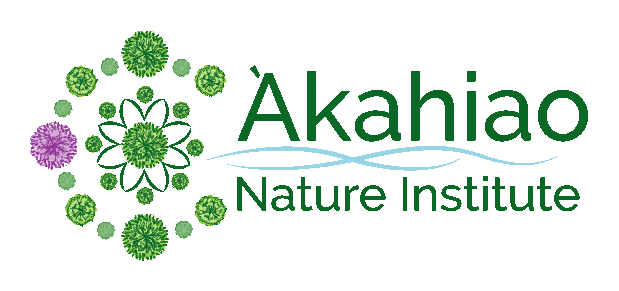Relearning the Past
- Liana Macdonald-Kainoa

- Sep 14, 2021
- 3 min read

It's hard to ignore the fact that there are a plethora of natural disasters that are hitting our country and around the world. Torrential floods, hurricanes, droughts, and fires are sweeping the nation. Many of which have been devastating to the people living in those areas. How has it come to this? Have we lost our connection with the natural world? While we are all looking for solutions to the future, perhaps we can find value in grounding ourselves in the most basic necessities of life and looking to the past for life lessons and learning.
I ka wā ma mua, i ka wā ma hope.
“In the time before, in the time after.”
This ōlelo noʻeau tells us that we need to look to the past in order to guide our future. How can we connect with a simpler past?
At ʻAkahiao Nature Institute we encourage and support learning ancestral skills that our forefathers and mothers were very maʻa (familiar) with; such as farming, tracking, gathering/foraging, plant medicine, fire starting, food preservation, and building shelter. We have come a long way since then, but perhaps itʻs time to reconnect with ancestral lifeways that were by nature
Foraging:
This one takes time and some creativity but could be a really cool hobby to do as a family. Take time with your ʻohana to investigate what wild plants growing in your area. This is a perfect opportunity to learn about the natural environment and the resources available to you.
Is there invasive or native plants that are actually edible and/or have beneficial properties? Many can be also be used for lāʻau lapaʻau (plant medicine). There are great books out there to learn from, some of the ones I have really liked are Hawaiian Herbal Medicine and Kahuna Lāʻau Lapaʻau.
If you need help identifying plants, you can simply use the Google Lens app to snap a picture of it and find it online. Be sure to identify it correctly by carefully inspecting the leaves, flowers, buds, etc. Once you have confirmed the plant and know its name, you can research and learn more about it.
Keep in mind that you want to be aware of whether plants in your area have been sprayed with herbicides or chemicals. If they have been, DO NOT consume them. Be sure that you are only eating organic non-treated plants.
If you want to learn more about foraging in Hawaiʻi check out Sunny Savage for yummy recipes and creative ways to utilize invasive plants like the haole koa. Other great books to learn more about native
Fire Starting
This seems very simple, but how many of you are able to start a fire from scratch? I can honestly say that I have not, but I am looking forward to learning how-to. Julie Rogers, ANI Director, was nicknamed “the firestarter” and she will be offering a Fire Starting Workshop at our upcoming program. The students will have the opportunity to learn how to make their own fire. One of the most primitive but practical skills to know. If you want to read about the origin of fire in Polynesia check out this paper here.
Tracking
Tracking and hunting animals in Hawaiʻi are very popular, especially on the Big Island, with the presence of game birds, pigs, goats, and sheep. I’m sure most of you have seen wild pigs running around. At Huʻehuʻe Ranch there are quite a few wild pigs living on the property. During our programs, we emphasize the importance of kilo (observation). Naturally, most students tend to find animal tracks, scat, and other animal clues. Tracking animals has been around since the beginning of human history. Our ancient ancestors used their observational skills to gain a deeper understanding of the landscape and the animals they were following. It is no different today. The same principles apply. You begin to see patterns and can predict animal behaviors based on what you have learned through kilo. Although we are not hunting during our camps, it’s still a fun skill to pick up and learn. It heightens our awareness of the world around us and allows us to take a closer look at the minute details we sometimes overlook. Most animals know where you are, but do you know where they are?
We look toward the past and we find value in the knowledge that was obtained through kilo and practice over thousands of years and passed down for many generations. It is our kuleana (responsibility) to keep that going. Knowing some of these ancestral skills will give you a boost of confidence next time you are out hiking in the wilderness or camping in nature. Have fun, be safe, and be aware.







Comments